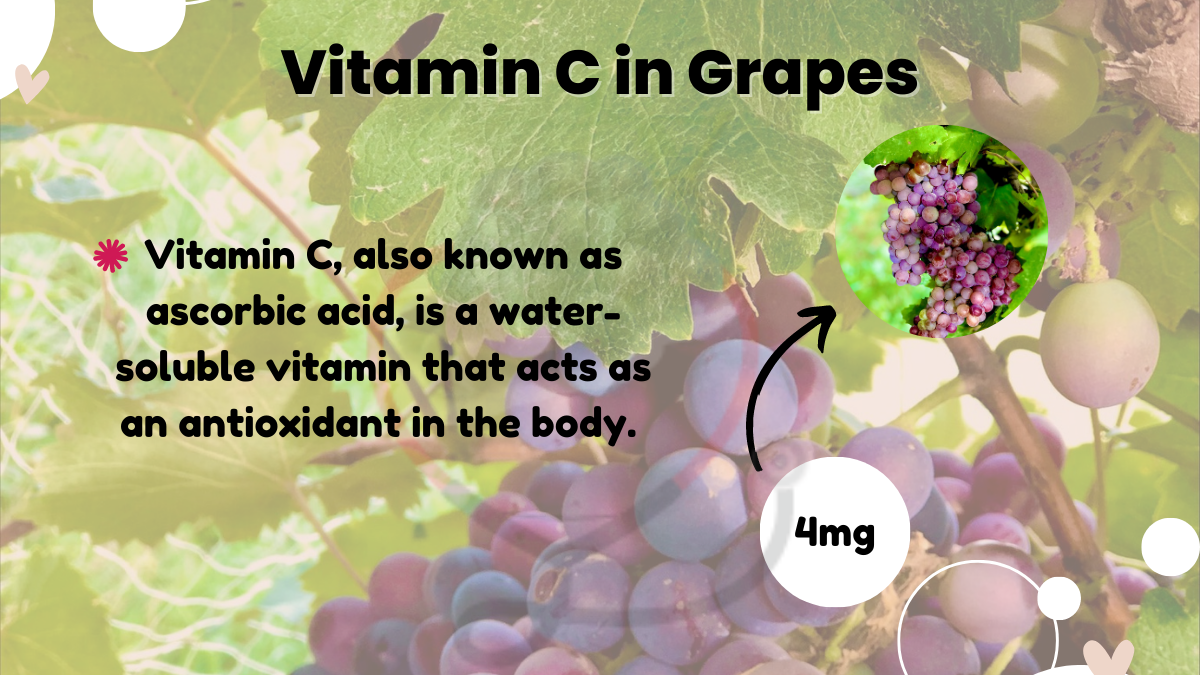Grapes are a delicious and nutritious fruit. Vitamin C in Grapes are not particularly high as compared to citrus fruits like oranges and lemons, they still contain a small amount of this essential nutrient. [1]
Vitamin C, also known as ascorbic acid, is a water-soluble vitamin that acts as an antioxidant in the body.
It is essential for the growth, development, and repair of tissues in the body, and plays a crucial role in the immune system, skin health, and iron absorption.

Unlike some other animals, humans cannot produce vitamin C in their bodies and must obtain it from their diet or supplements.
In this article will explore the benefits of vitamin C in grapes.
Benefits of Vitamin C in Grapes
Grapes are an excellent source of vitamin C, with one cup of grapes providing about 27% (4mg) of the daily value (DV) of this nutrient.
Here are some of the benefits of vitamin C in grapes. [2]

1: Boosts Immunity
Vitamin C in grapes boosts immunity by stimulating white blood cell and antibody production, reducing the risk of colds and respiratory infections. [3]
2: Protects Against Oxidative Stress
Grapes are rich in antioxidants, including vitamin C, which help protect the body against oxidative stress and damage caused by free radicals.
This, in turn, may help reduce the risk of chronic diseases such as cancer, heart disease, and Alzheimer’s disease. [4]
3: Supports Skin Health
Vitamin C is essential for the production of collagen, a protein that gives skin its elasticity and firmness.

Adequate intake of vitamin C can help prevent wrinkles, fine lines, and other signs of aging, as well as promote wound healing and skin repair. [5]
4: Enhances Iron Absorption
Vitamin C enhances the absorption of non-heme iron from plant-based foods, such as leafy greens, grains, and beans. [6]
This is especially important for vegetarians and vegans, who may have lower iron stores and need to consume more vitamin C-rich foods to meet their daily requirements.
Sources of Vitamin C in Grapes
Grapes are a good source of vitamin C, but the amount may vary depending on the variety, ripeness, and preparation method. Here are some common dietary sources of vitamin C in grapes: [7]
- Red grapes: 1 cup contains about 27% DV of vitamin C
- Green grapes: 1 cup contains about 21% DV of vitamin C
- Grape juice: 1 cup contains about 100% DV of vitamin C
- Raisins: 1/4 cup contains about 2% DV of vitamin C
Recommended Intake of Vitamin C
The recommended daily intake (RDI) of vitamin C for adults is 90 mg for men and 75 mg for women.
However, certain factors such as age, gender, pregnancy, and smoking status may increase the need for vitamin C.
It is generally safe to consume vitamin C from foods and supplements, but high doses may cause side effects such as diarrhea, nausea, and stomach cramps.
Vitamin C is a vital nutrient that plays many important roles in the body, including supporting the immune system, protecting against oxidative stress, promoting skin health, and enhancing iron absorption.
Grapes are a delicious and convenient source of vitamin C, with red and green grapes providing about 21-27% DV of this nutrient per cup.
FAQs
Are grapes a good source of vitamin C?
Yes, grapes contain 75% (4mg) of the daily value (DV).
Do red grapes have vitamin C?
Yes, Grapes also contain small amounts of these nutrients: Vitamin A. Vitamin C.
Can eating too many grapes be harmful?
Grapes are generally safe to consume in moderate amounts, eating too many of them can lead to digestive issues such as diarrhea, bloating, and gas.
Can vitamin C supplements replace the need for eating fruits and vegetables?
Vitamin C supplements can be helpful for people who have trouble meeting their daily requirements through their diet, it is always best to obtain nutrients from whole foods as much as possible.
Can vitamin C prevent or cure colds and flu?
Vitamin C has been shown to boost immune function and reduce the duration and severity of colds and flu in some studies; it is not a cure for these illnesses.

